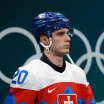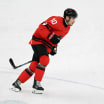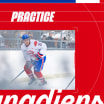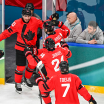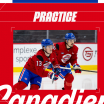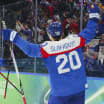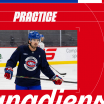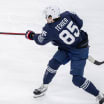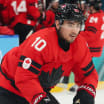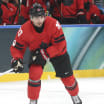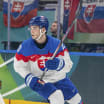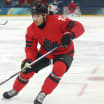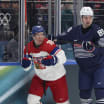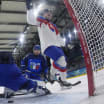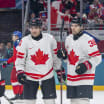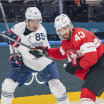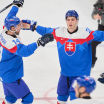Hughes: 'We're trying to evaluate how a player projects'
General manager Kent Hughes says the debate over the top pick continues, but three players are being considered
Kent Hughes and Vincent Lecavalier on the Draft
SHOP: Official 2022 NHL Draft Cap
During the press conference, Hughes confirmed that the Canadiens haven't yet decided which player they will draft first overall.
Three players are under consideration, including forwards Shane Wright, Juraj Slafkovsky and Logan Cooley.
Hughes indicated that a consensus on the top selection hasn't been reached because he'd like all the club's scouts, who've now gathered in Montreal for pre-Draft meetings, to provide their respective input on the top prospects.
The Habs' GM didn't rule out trading the top pick, however, if the right offer presented itself.
If the Draft was held tonight, though, Hughes would step up to the microphone and make the coveted selection.
Here are a few highlights from the press conference:
Hughes on the criteria being considered with respect to the first overall pick:
It's about evaluating the players. We're essentially projecting a player's future, what kind of player he could be at the NHL level. That's what our evaluations are all about. We aren't determining who the best 18-year-old player is, we're looking at who could be the best player at 22, 23 and 24 years old. We want a player who could help us build a winning team year after year.
Picking the best player for the future. #GoHabsGo | #NHLDraft pic.twitter.com/q3hFK1DU0U
— Canadiens Montréal (@CanadiensMTL) July 4, 2022
Hughes on possibly trading the first overall pick:
I know it wouldn't be the most popular decision for the fans. If the Draft was tonight, we'd be picking a player. But at the same time, my responsibility is to work and help the Canadiens for the future, so we're always going to look at all our options to improve the team.
Hughes on the specifics that still need to be debated regarding the top selection:
We're trying to evaluate how a player projects. We can look at a hockey player and say, 'This is what he is as a hockey player at this moment in time and where he's playing.' Players are playing in different leagues at different levels of hockey, and we're trying to look at them and say, 'This guy's able to do this at this level, can he do it at the next level?' There's a hockey component to it, too. There's a positional component. There are all of these things that we're evaluating. Can he play at that position at the next level? The other part is to understand that it's hard to be 17 years old and be under the microscope as Shane has and others have before him, but it's probably almost harder to be the first overall pick in Montreal, so as part of our evaluation we're not just evaluating hockey players, we're evaluating character, we're trying to evaluate their ability to deal with that type of pressure on a consistent basis.
Hughes on building for the future via the Draft, with 14 picks at his disposal:
When you're sitting with the first overall pick, you're excited. I expect that we're going to use that pick, but I can't sit here and promise that we would if we received a phone call and it was too good to turn down. We have the ability to add an important piece to our organization, or pieces, because we do have multiple picks in the Draft that we're hopeful will be a part of the next 10, 15 years of this organization. As far as the potential to make trades or change our roster, the one thing that we're clearly trying to do, we've been up front about it and that's why Shea Weber's contract was traded, is we're trying to achieve some financial flexibility or cap flexibility so that we can sign players that we have and hopefully add players as we move forward.
Hughes on the process of projecting a player's potential for future success:
We're watching games. We're evaluating what they have in their game and what they need or could add to their game. Identifying what they need to do to be a better hockey player is easy, but to assume that every player has the willingness to learn and the capacity to learn and incorporate that into a game that's very instinctive and reactive, that's taking a leap to just assume everybody can do it. I used to make that mistake a lot when I first started, where I'd watch a player and say, 'With some good coaching, this guy's going to become A, B or C,' and sometimes they don't. At the end of the day, we're trying to figure out how complex the changes that need to happen for somebody to reach their full potential are. Who's the best now? Who has the most potential? We're looking at the risk and reward of these picks. It's not so much a hesitation. We really want to invite our group to have an opinion and begin to understand how they evaluate and think about hockey players, too.
Hughes on character traits he's seeking in a prospect:
We're doing interviews, so we're learning about their character. We're talking to a lot of people that know these players from different points and paths in their lives. And then there's just a certain element of a player's character that you also see when they're playing. It doesn't take long to figure out Brendan Gallagher's character when you watch him on the ice. You see the competitiveness. Character is important for us. I don't think talent alone is enough for most people. Mario Lemieux probably could've gotten by on talent alone, but he may be one of a very limited group of hockey players in the history of the game who could do that. We do value hockey sense, but hockey sense to me is also, in part, understanding what your assets are and knowing your greatest attributes and how to make them most impactful in a game.
Lecavalier on his best advice for the first overall pick:
It's something I would tell anybody in a Draft. It doesn't matter where you get drafted. As soon as the Draft is over, it doesn't matter if you're first or 200th, everybody's goal now is to make the NHL. I'd say being a first-rounder, you might get a quicker opportunity, but basically forget about the Draft and move on. Now it's like, 'You're part of this team now and your only goal is to make that team as quickly as possible, or when the time comes, and be a part of it.' My advice is to enjoy the day, but after that, you've got to get to work and do everything you can to make your dream come true.
Some words of wisdom from Vinny. #GoHabsGo | #NHLDraft pic.twitter.com/ijFEePdhNT
— Canadiens Montréal (@CanadiensMTL) July 4, 2022
Hughes on whether the top pick must be NHL-ready to be selected:
We'll be patient. The most important thing with respect to all the prospects is that they reach their potential as a hockey player. If all our players reach their potential, we'll have more success in the future as an organization.

